
First and Only Weekly Online Fanzine Devoted to the Life and Works of Edgar Rice Burroughs Since 1996 ~ Over 10,000 Webpages and Webzines in Archive |

First and Only Weekly Online Fanzine Devoted to the Life and Works of Edgar Rice Burroughs Since 1996 ~ Over 10,000 Webpages and Webzines in Archive |
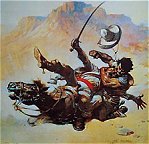

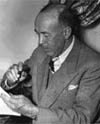
I read this book for the first time a couple of weeks ago, and noticed several variations on themes which are present in many of ERB’s books. This one is a bit unusual, and ERB’s treatment of the ethics involved seems to draw from the concept of Tarzan of the Apes; yet the urban setting makes it quite difficult to accept as wholeheartedly as I accept the ethics of the ape-man.Billy Byrne is in some respects an urban Tarzan. His jungle is composed of the streets and alleys of Chicago’s great West Side. His “natural” ethical teachings are those of his peers and heroes; people who possess little or no ethical principles. This might be considered analogous to Tarzan’s jungle in some respects. In other respects he represents precisely what Tarzan is not.
Shanghaied and about to be bullied, ERB describes the mucker:
“But the mate was not acquainted with Billy Byrne of Kelly’s gang. Billy’s brain was befuddled, so that it took some time for an idea to wriggle its way through, but his courage was all there, and all to the good. Billy was a mucker, a hoodlum, a gangster, a thug, a tough. When he fought, his methods would have brought a flush of shame to the face of His Satanic Majesty. He had hit oftener from behind than from before. He had always taken every advantage of size and weight and numbers that he could call to his assistance. He was an insulter of girls and women. He was a bar-room brawler, and a saloon-corner loafer. He was all that was dirty, and mean, and yet, notwithstanding all this, Billy Byrne was no coward. He was what he was because of training and environment. He knew no other methods; no other code. Whatever the meager ethics of his kinds he would have lived up to them to the death. He never had squealed on a pal and he never had left a wounded friend to fall into the hands of the enemy — the police.”This is not so dissimilar in some respects to Tarzan, who is what he is because of training and environment. Tarzan kills without remorse those whom he regards as his “enemies”, and D’Arnot has to restrain him when the reach civilization. The blacks had been his enemies. They were for killing. He knew no other way to perceive black men.We can accept it much more with Tarzan than with Billy, however; for Billy is aware that ethical codes exist. He lives in society, and knows about them. He knows that his behaviors are inconsistent with the norms of the major social group of which he is a member. His behaviors are motivated by self-interest, as are those of the ape-man, but they are based upon irrational self-interest and peer group mores; whereas Tarzan’s are based upon the natural self-interest and self-preservation which motivates the beasts.
Once Tarzan learns about civilization, he immediately recognizes the ethical principles which govern men who live in groups, and as an individual he considers them for what they are. He does not blindly accept them; nor does he feel obligated to incorporate them into his lifestyle as a moral imperative. He accepts them as a force of law within society, but not necessarily within his own jungle, and he accepts or rejects them based upon his own reasoning; not because of peer pressure.
Nor does Billy Byrne possess that characteristic which so permeate most of ERB’s books. Breeding. He is a mucker by birth, by training, and by his own actions. He is a very unusual character by Burroughs’ standards, and it appears ERB was exploring some of the ideas and themes he had worked with in other books, by altering them somewhat. In these early books he looked at some of these themes from various points of view.
In Cave Girl we have the emergence of the Primal Male from the Civilized man (and the emergence of the Princess from the Cave Girl). Here Thandar learns to shed his mores and habits and weakness in order to survive and conquer in a world which is not based upon social mores and the force of law. Thandar remains a man of society, however, and his savagery is a veneer, however effortlessly he dons it.
In Tarzan of the Apes we have the emergence of an “acceptably” civilized man from a true Primal Male, but his social mores are a veneer. Savagery is his natural state.
Thandar is in some respects the counterpart of the ape-man, and his book complements the themes present in the Tarzan books.
Billy Byrne is a man who emerges as a “civilized” man, by choice, and proceeds to become “civilized”; not as a veneer, but as a conscious, rational choice, on a permanent basis. Yet he is not as acceptable as a hero, at least to me, because the tools were always there for him to use. He had a mind and refused to use it. His behaviors are perhaps as realistic, under the circumstances, as we might expect; but they are less acceptable nonetheless. Perhaps that’s one reason ERB didn’t provide him with a pedigree, and one reason he refrained from utilizing such characters in later books.
When we consider the ape-boy pondering over the tiny bugs in a remote cabin, searching so desperately for food to nourish his awakening intellectual growth, it’s difficult to easily accept a man who is surrounded by such nourishment but disdains it because of those who surround him.
His character is actually more attuned to the types of “heroes” we often see in modern fiction these days, with all their problems and dark pasts, questionable morality, and so forth, but as an ERB-type hero he doesn’t compare too favorably with the others created by Burroughs. Even after he adopts new ethical standards, he has difficulty with a rational code of behavior. He steals from a bank in Mexico, almost on a whim, and in fact because of the theft the American ranch can’t meet its payroll.
His is a mix of conditioning and self-interest and environment which he finds hard to completely reject, and in some ways this is a very thoughtful book. ERB sets forth the injustice of the legal system, as Billy is convicted for murder; quite well. Then, as is often the case now, law enforcement often are more concerned with convicting a person than with convicting a guilty person; and this was dealt with fairly well. ERB is good at examining society’s faults and fictions, and his treatment of class and justice in our own country is interesting.
The emotional perspectives of class distinctions and subjective envy/hatred felt by men like Billy are also brought out in a manner which lets us feel them as Billy must have felt them.
In some respects the book reflects pure ERB. I always enjoy the odd scenarios he sometimes creates, and it’s apparent ERB enjoys them too. When Billy and Theriere rescue Barbara:
“It was a strange, weird picture that the oddly contrasted party presented as they raced through the clearing of this forgotten isle toward a jungle as primitive as when “the evening and the morning were the third day”. An American girl of the highest social caste borne in the arms of the most vicious of all social pariahs — a criminal mucker of the slums of a great city — and defending them with his drawn revolver, a French count and soldier of fortune, while in their wake streamed a yelling pack of half-caste demons clothed in the habiliments of sixteenth century Japan, and wielding the barbarous spears of he savage head-hunting aborigines whose fierce blood coursed in their veins with that of the descendants of Taka-mi-musu-bi-mo-kami.”And we see a bit of the ape-man in the Mucker as he later fights for her:“The girl saw the white man leap to one side to escape the furious cut aimed at him by his foe, and then she saw him turn with the agility of a panther and spring to close quarters with the wild man. Byrne’s left arm went around the Malay’s neck, and with is heavy right fist he rained blow after blow upon the brown face.”How different is this from a savage man whose arm encircles the neck of Numa, while he stabs again and again with his other hand? ERB also injects another Tarzan theme, as Billy tells Barbara:“...I never was well acquainted with any human being that wasn’t a thief, or a pickpocket, or a murderer — and they were all beasts, each in his own particular way, only they weren’t as decent as dumb beasts.”The romance is written pretty well in some respects, and does engender feelings for the character:“I’m going to lose you any way you look at it, and — and — oh, can’t you see that I love you?”I thought this was very well written. ERB can capture the mix of emotions which move a man in love, and the humiliation and hurt he describes in these passages was something I could feel. A page later he says to her:
Barbara Harding looked at him for a moment, and then she did the one thing which could have hurt him most — she laughed. The color mounted to Billy Byrne’s face, and then he went very white.”“‘Sit tight”, he whispered,. “I’m going to get’em.” and then, fiercely, “for your sake, because I love you — now laugh,” and then he was gone.’I enjoyed these passages and thought they expressed feelings I might have felt if I had been Billy. ERB is perhaps the best I’ve ever read at engendering strong feelings within a reader with a bare minimum of words.The romance takes a turn for the worse later on, however, as Billy refuses to fight to win her hand in marriage, even though he knows she loves him. I had a hard time with that, as I had a hard time with the end of Tarzan of the Apes.
The last half of the book didn’t thrill me much. Again his ethics and behaviors are muddled, and however “realistic” that might be, it’s not something I expect in a book by ERB. It was a good story, and an interesting presentation of the power of one’s peers and one’s environment, but Billy is a bit out of place among other ERB heroes, as a result.
I found the ending to be a bit predictable and hurried. The confession of the guy who really committed the murder, and Billy’s pardon, lack the realism which the book otherwise sets forth, and reminds me of some of the “quick” endings in a few of the Pellucidar books, and in Foreign Legion; as if ERB thought, “Well, I need to end this book now, irrespective of where the story might be at that point.”
I enjoyed this book, which tells a good story and does explore the importance of an unusual environment and maturation in a “civilized” culture. I didn’t entirely accept Billy as a hero as much as I do with some of ERB’s others.
It’s not so different from the ethics he presents in his other books, in many respects, but I at least have a much more difficult time accepting “society” as an enemy of Billy and his sub-culture.
In Pellucidar the standard greeting to a stranger is “I kill” (and I’m pleased that this has appeared on the listservers). Among the apes we have “Kreegah! Bundolo!” which, although it doesn’t appear frequently in the prose in those precise words, does reflect the boastful, wary, near-violent aggressive attitudes which male apes tend to adopt towards those who are not clearly friends (at the moment).
These social groups possess attitudes which, like Billy’s, have little or no regard for any other social group. They have learned such attitudes, as has he, from those around them and from their own experiences. Yet we accept them more easily because their social group is the dominant social group. They are not exceptions to the broad social mores of their society. Moreover, their survival depends upon such ethics. Prejudice is a survival skill among primitive societies. That’s one reason it is so difficult; perhaps impossible; to eradicate. It has evolutionary roots.
This is a major theme throughout ERB’s books. We are naturally suspicious of those who are “different”. What we learn in our social groups defines “different”.
In most of ERB’s books the characters have virtually no opportunity to learn any other means of dealing with others, and in fact there is nothing to learn. Their entire known world adopts similar ethical standards.
This is not the case with Billy. Nor do his ethical wanderings except the treatment of the weak and the feminine. He treats women with contempt, and will harm them as easily and casually as a man. This is a sharp departure from the behavior and attitudes of even those grumpy apes and those ready-to-kill inner-Earthers. Only ERB’s villains treat women in such a fashion. His other positive primitive characters may capture them, but then they fall in love with them.
While I have never entirely accepted Tarzan’s treatment of Jane as an “inherited” nobility, since I don’t accept inherited values, I can accept it as a matter of sexual evolutionary behavior and rational self-interest. Protectiveness, attraction, and emotion are powerful concepts, and we still know little about many of these drives. Although rape is a common occurrence among animals, I’m not convinced that it occurred as a matter of course whenever a male desired sex, particularly among the higher mammals. Emotion and bonding between a male and a female cannot be wholly discounted. Tarzan might have learned this from the apes, without conceptualizing it, though it’s not mentioned, and we can only speculate as to what other evolutionary traits he (and we) might possess towards a desirable female which might temper our lust and aggression.
Billy however adopts mores which run contrary to these concepts, although he matures in the midst of a society in which they have been the unchallenged standard for hundreds of years. Although he “learns” that his social values are wholly inappropriate, it is apparent that he could have learned this, and should have learned it, long ago.
Thus, he is not quite as acceptable as a fictional hero when compared with ERB’s others, as a subjective matter; at least for me, though he is a heroic figure, and the margin of difference is slight in the end.
I am pleased that ERB wrote this one, and found his treatment and exploration of these concepts was imaginative and interesting. I don’t know what types of heroes abounded in fiction back then, so I can’t know whether the portrayal of such a man as a heroic figure was a gamble; but it does present food for thought and a quite unique character among those we’ve come to admire in the world of ERB.
~~Robert "Tarak" Woodley
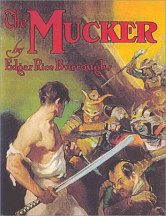
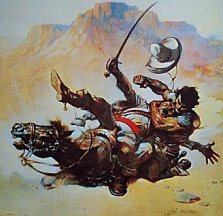
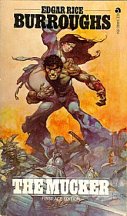
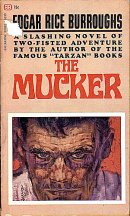
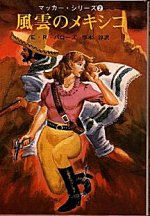

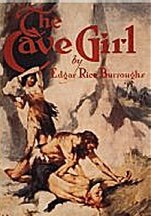
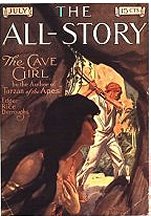
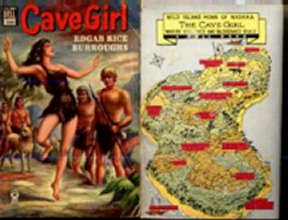
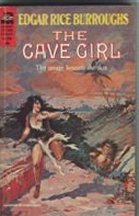
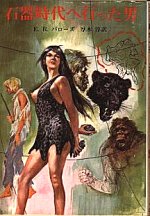
Mucker \Muck"er\ (?), n. A term of reproach for a low or vulgar labor
person. [Slang]
Mucker \Muck"er\, v. t. To scrape together, as money, by mean labor
or shifts. [Obs.]
-- Webster 1913
|
Lands of Adventure is found at www.geocities.com/danestargems/ |
The List With No Rules is found at THB@yahoogroups.com |
|
ERBzine 0099 TARAK'S FARSIDE CHAT: Disney Tarzan Preview Review ERBzine 0137Tarzan and the Forbidden City Review ERBzine 0191 DD99: Thanks for the Memories by Tarak ERBzine 0418 Tarak and the Jewels of Louisville ERBzine 0419 Tarak and a Princess of Stories ERBzine 0420 Tarzan of the Apes in All-Story pulp magazine ERBzine 0316 Tarak Poetry in Motes & Quotes ERBzine 0060: The First Time ERBzine 0685 Tarzan of the Apes: A Personal Journey Through 24 Volumes ERBzine 0708: Tarak's ERB in Verse ERBzine 0709: Kipling and ERB ERBzine 0710: The Mucker: An ERBapa Reprint ERBzine 0707: Dum and Dummer 2002 |
![]()
![]()
Volume
0710

WEBJED:
BILL HILLMAN
Visit
our thousands of other sites at:
BILL
AND SUE-ON HILLMAN ECLECTIC STUDIO
All
ERB Images© and Tarzan® are Copyright ERB, Inc.- All Rights Reserved.
All
Original Work © 1996-2002/2010 by Bill Hillman and/or Contributing
Authors/Owners